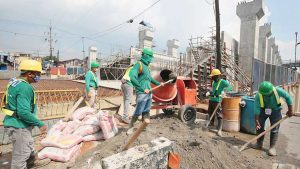
By Beatriz Marie D. Cruz, reporter
Long-delayed infrastructure projects in the Philippines could get a boost with the passage of the Accelerated and Improved Right-of-Way (ARROW) Act, according to analysts.
Republic Act No. 12289, which was signed into law last month by President Ferdinand R. Marcos, Jr., amended the Right-of-Way Act of 2016 to make property acquisitions faster, more transparent, and predictable.
Under the new law, agencies and private concessionaires must deposit an advance equal to 15% of their market value on properties earmarked for acquisition – including crops, trees and improvements.
“By standardizing compensation and requiring upfront deposits, both landowners and developers get greater transparency and security,” said Jamie S. Dela Cruz, research manager at KMC Savills.
“For the property sector, this translates into rapid price appreciation in areas near clear growth corridors and planned infrastructure,” he said.
“Developers, investors and businesses can plan with greater certainty, while land owners will benefitfi“It’s more predictable compensation.”
Colliers Philippines director and head of research Joey Roi H. Bondoc said the amended ROW Act will support real estate expansion outside Metro Manila.
“You can't achieve both infrastructure implementation and decentralization if you can't acquire the assets needed to build the infrastructure,” he said.
Analysts have noted the growing interest of developers in regional areas such as Pampanga, Cebu, Bacolod and Davao, amid favorable economic conditions and talent pool.
However, Ms. Dela Cruz cautioned that uneven implementation at the local level and potential speculative price rise in takeover areas remains a risk.
Roadblocks have been hampering infrastructure projects for a long time, hampering expansion plans of property developers.
Apart from resolving RoW bottlenecks, the government should strengthen urban planning and zoning to prevent congestion and ensure that infrastructure projects support balanced growth, he said.
He also stressed the need for more efficient permits, land ownership and property registrationmarginal forceSystematic housing for middle income and working class families.
“It must also ensure that public-private partnerships in key growth areas align infrastructure with commercial, industrial and residential demand,” he said.
“If these issues are addressed together, the ARROW Act can become a real catalyst not only for infrastructure delivery but also for a more competitive, flexible and inclusive Philippine property market,” Ms Dela Cruz said.










